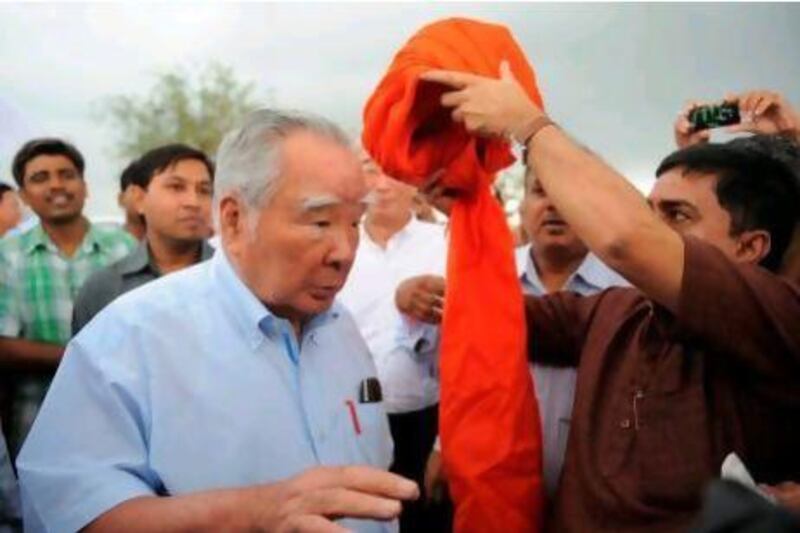NEW DELHI // Production at one of India's largest car plants has resumed following a riot that left a manager dead and 50 executives injured.
The Maruti Suzuki plant has been closed since the violence by workers on July 18, triggered by a floor-supervisor's mistreatment of an employee.
The facility, in the town of Manesar, Haryana, reopened last week with supervision from nearly 1,500 policemen, but analysts say deeper political and systemic problems still plague India's industrial labour force.
The Haryana government has ordered an inquiry into the incident at the behest of the company, a subsidiary of Japan's Suzuki Motor Coroporation.
In a meeting on Sunday, Osamu Suzuki, chairman of the parent group, pressed Haryana's chief minister, Bhupinder Singh Hooda, to find the "root cause" of the violence.
The plant is now operating considerably below capacity, making 150 cars a day instead of the usual 1,700.
Nearly 500 workers were fired after the riot and have not been reinstated, despite demands from the Maruti union. The floor supervisor, however, was not disciplined
When asked about the sackings, Mr Hooda said it was "a matter between management and labour".
The sackings were described as a "retaliation" and an "illegal move" by Tapan Kumar Sen, a member of parliament from the Communist Party of India.
"Maruti cannot dismiss so many people, according to the law, without prior permission of the state government," said Mr Sen, who has been pursuing the issue in parliament.
"But in this case, they are being deliberately allowed to get away with it, by the Haryana government, in the guise of promoting investment."
Considerable investments are at stake. Suzuki is opening its first research and development centre outside Japan in the Haryana town of Rohtak, spending 17 billion rupees (Dh1.1bn). A new motorcycle factory is also being created there. Maruti Suzuki's four plants in Haryana produce 1.2 million cars every year.
Media reports have described the unrest was brewing long before the riot on July 18.
An independent workers' union has been negotiating for a three or four-fold increase in basic pay, plus more benefits for shop-floor workers.
Pay talks were continuing when the violence broke out. Afterwards, SY Siddiqui, Maruti Suzuki's chief operating officer, told The Hindustan Times newspaper that "the tragedy has changed everything".
Nikhil Mehra, a Supreme Court advocate with experience in labour disputes, said Maruti workers' wages were among the lowest in the automobile industry in India, despite the company's stellar profits.
In the first quarter of this fiscal year, Maruti Suzuki registered a profit of 4.23 billion rupees.
"So they just wanted a piece of the pie," Mr Mehra added.
Mr Mehra raised another thorny issue within the Indian manufacturing sector - the disparity between permanent employees and so-called contract labourers.
The wage gulf between them is significant. The best-paid permanent employees can make as much as 25,000 rupees a month, but contract labourers work for half or even a third of that amount, with no benefits, such as travel reimbursements or bonuses.
Given the plentiful supply of blue-collar workers in India, manufacturing companies tend to staff factories with large numbers of contract workers.
At Manesar, two-thirds of the nearly 3,000 employees are contract workers. The union represents only permanent employees.
According to a 1970 law, Mr Mehra said, the government can abolish contract labour for a particular industry or employer if "the work is perennial and primarily skill-based".
But the legislation neither requires them to act in every case, nor demand that employers forced to let go of contract labourers rehire them back as permanent workers.
"It's tough to say that the Haryana government sidestepped its duties in this case, because these questions come with dual considerations," Mr Mehra said. "They will also be thinking that they want to keep their special economic zones alive and therefore keep labour costs down.
"That would have been the purpose behind not acting, although it goes against the spirit of the [contract labour] act."
[ ssubramanian@thenational.ae ]
Follow
The National
on
[ @TheNationalUAE ]
& Samanth Subramanian on
[ @Samanth_S ]





